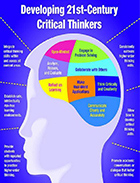Playing builds curiosity in children
Playing builds curiosity in children
 English philosopher and physician John Locke had quoted “Curiosity in children is but an appetite for knowledge. The great reason why children abandon themselves wholly to silly pursuits and trifle their time insipidly is, that they find their inquiries neglected". The need to explore and learn newer things is the driving force behind a child's curiosity.
English philosopher and physician John Locke had quoted “Curiosity in children is but an appetite for knowledge. The great reason why children abandon themselves wholly to silly pursuits and trifle their time insipidly is, that they find their inquiries neglected". The need to explore and learn newer things is the driving force behind a child's curiosity.As educators and parents who deal with kids during their adolescence years, we know that they are curious beings who learn through the forces of questioning, exploring and wondering. But what stops a child from being the ‘curious cat’ who stops himself/herself from learning?
Disapproval, fear and absence are said to be some of the natural extinguishers of a child's curiosity. Constant ‘don'ts’ snuffs out the curiosity as a child tends to imbibe the same insecurities as their parents. Constant fear of facing the repercussions of doing something shuns the child to his/her comfort zone and they become less adventurous. The absence of a caring parent puts out the sense of wonder in the nature of the child as they lack security, making them feel insecure all their life.
So, what fosters a child’s curiosity and creates in him/her the need to learn?
Play, often misconstrued by people as a sheer waste of time, is what fosters a child's curiosity. Play in a child is a spontaneous, natural, enjoyable and a self-initiated process. Even plays that are not engaged in any learning outcomes, promotes growth and development. Functional Plays help develop a child’s senses and muscles to explore and experiment with materials, and Constructive Plays help a child to learn by using materials that are put together and to develop using strategies to reach their goal.
Dramatic or Pretend Play encourages the child to take on roles to see the other side of the coin and to also use certain words and gestures that are associated with that type of play. Games with rules help children to mutually play with each other while controlling their behaviour and conforming to a set of pre-determined rules. These forms of plays are merely not a form of entertainment nor can they be underestimated as an inconsequential element in the lives of children.
So, let us let our children PLAY and learn.





















